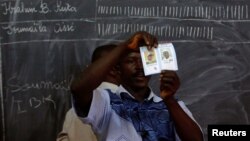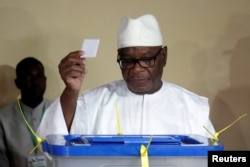Vote counting is under way following the second and final round in Mali's presidential election. Voting on Sunday was peaceful, but many Malians are cynical about their country's political system, and most did not vote.
Concerns about Islamist attacks may have kept some away from polls in the countryside — where violent incidents marred the first round of voting in July — but, in the capital of Bamako, businessman Bahama Sidibe says many are simply disappointed with politics.
Sidibe says many people feel it does not matter which of the two remaining candidates wins, as nothing will change either way.
Others stayed away because they felt the election would be rigged. A few hundred people gathered in downtown Bamako as the polls closed Sunday to protest election fraud.
Teacher Fatoumata Diarra, one of the protesters, told VOA the first round of results was tainted by vote rigging. Diarra claimed votes had been bought, and that fictitious supporters had cast their votes under false names.
Authorities deny the allegations. While 18 of 23 opposition candidates claimed irregularities in the first round of voting, little evidence of widespread voter fraud has emerged.
But transparency remains crucial in the minds of many election observers, especially the European Union. The EU observer mission's leader, Italian politician Cecile Kyenge, noted some delays in the first round.
"We had demanded the publication of the results for each polling station," Kyenge said. "A request that was finally granted by the Malian Ministry of Territorial Administration that calls the provisional results. The other request was the publication of the electoral lists. This will enhance the election's transparency."
The first results from the presidential runoff are expected Tuesday. The final results probably will not be known until the end of the week.
President Ibrahim Boubacar Keita is expected to win a second term over opposition leader Soumaïla Cisse; Keita took 41 percent of the vote in the first round.
However, political analyst Ballan Diakite says Keita has lost a large number of allies — a few of whom decided to run for the presidency themselves. While Keita is a head of state, Diakite says, he is a poor people manager who will increasingly rely on a close circle of associates who understand the old saying: You are either with me or against me.
The result, Diakite predicts, is further polarization in Mali's political landscape.





